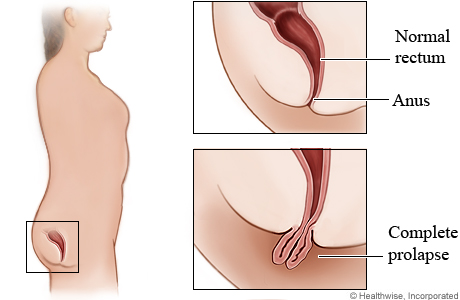Our Health Library information does not replace the advice of a doctor. Please be advised that this information is made available to assist our patients to learn more about their health. Our providers may not see and/or treat all topics found herein.
Rectal Prolapse

Rectal prolapse happens when loose tissue in the rectum slides downward. The loose tissue may partially or completely stick out of the anus.
Rectal prolapse is most common in young children and older female adults. Treatment for rectal prolapse depends on the type of prolapse. It may include changes in diet, medicines, or surgery.
Many conditions increase the risk for rectal prolapse. But the exact cause is usually hard to find.
Current as of: October 19, 2024
Author: Ignite Healthwise, LLC Staff
Clinical Review Board
All Ignite Healthwise, LLC education is reviewed by a team that includes physicians, nurses, advanced practitioners, registered dieticians, and other healthcare professionals.
This information does not replace the advice of a doctor. Ignite Healthwise, LLC disclaims any warranty or liability for your use of this information. Your use of this information means that you agree to the Terms of Use and Privacy Policy. Learn how we develop our content.
To learn more about Ignite Healthwise, LLC, visit webmdignite.com.
© 2024-2025 Ignite Healthwise, LLC.


